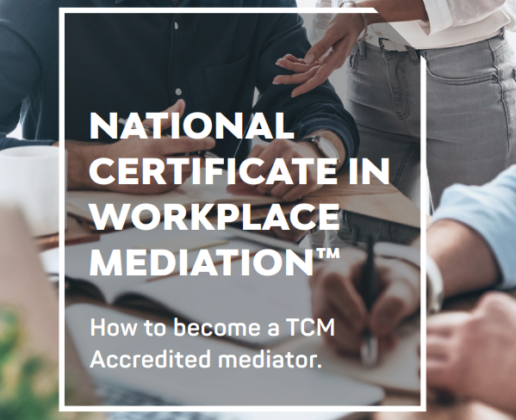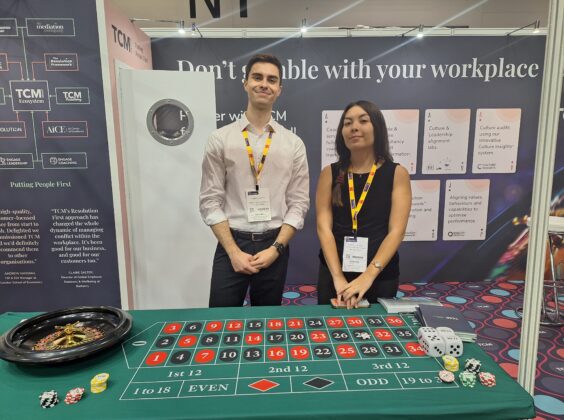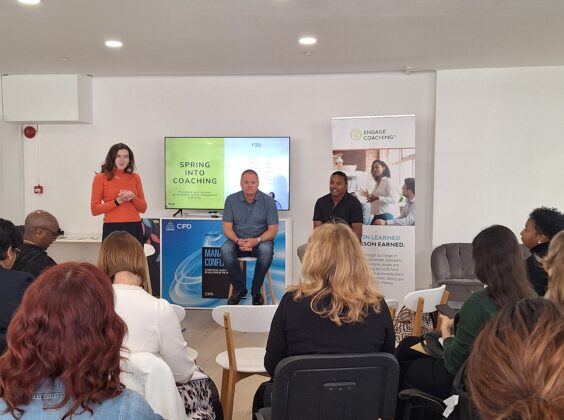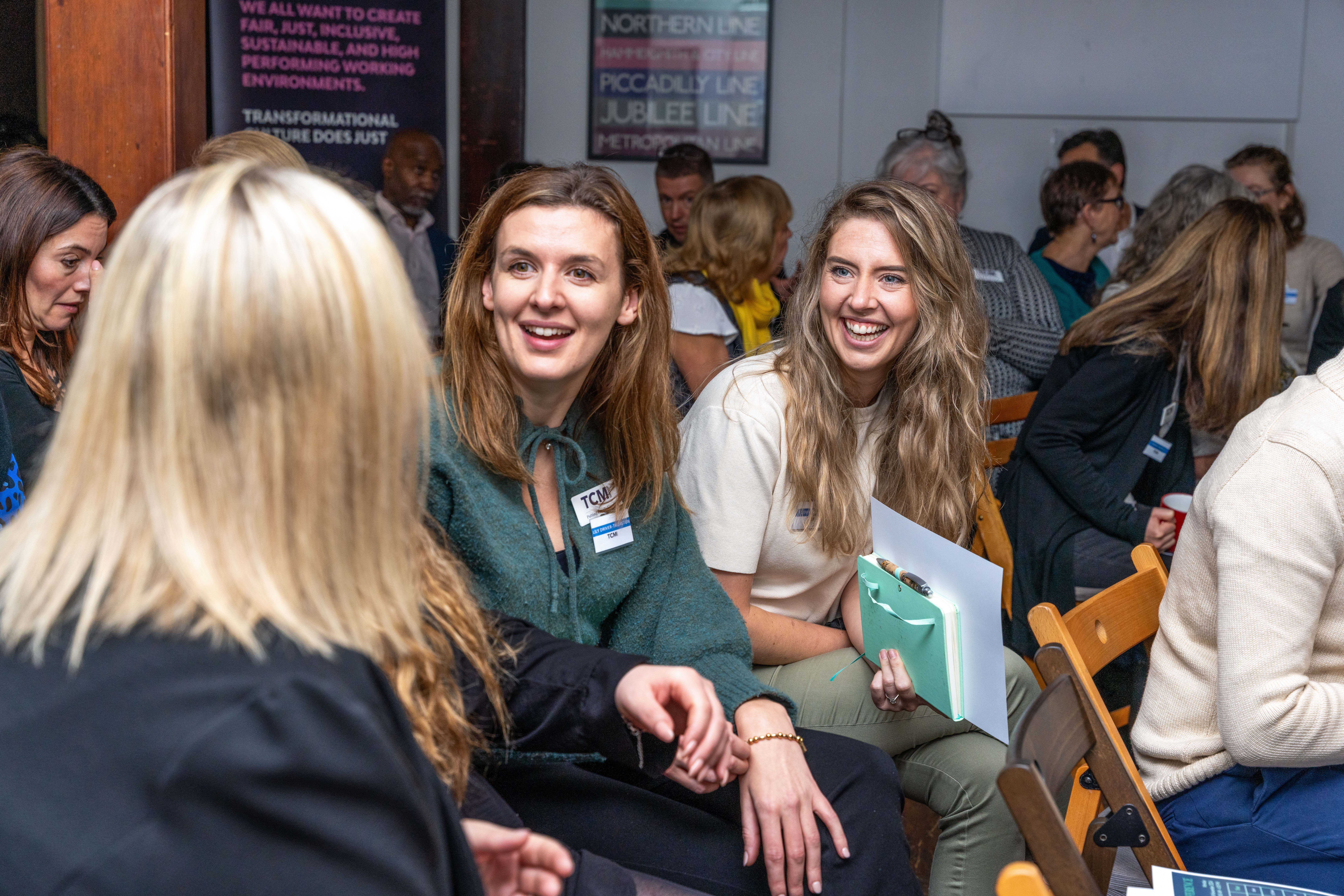
Share article:
Tags:
As a new member of the marketing and communications team at The Mediation Company and its partner The TCM Group, my induction into the people-centred culture at TCM continued with a five-day training experience on their National Certificate in Workplace Mediation course. Mediation is the service that both The Mediation Company and The TCM Group were founded on, providing resolution services to workplaces across countless organisations, so it was important that I learned first-hand what they were all about.
Listening and learning
Much like the mediation process, our first day involved a lot of listening. Our trainer, Alex Dunlop, brought his lifetime of experience and knowledge to the fore as we delved into the theoretical foundations of mediation. In order to learn, it was first imperative to unlearn.
“When we think of conflict, we think of struggle, battle, clash and quarrel. But sitting with emotion, letting it ruminate, can be profound and powerful.”
Our trainer explained that conflict is double-pronged: constructive or destructive. And it’s our actions, interactions, and reactions that determine whether the conflict becomes constructive or whether it turns destructive. If we take the constructive path, then in actual fact, conflict is productive, fundamental, and essential to any and all workplaces. To challenge is to evolve and grow, and the importance lies in how we choose to deal with this conflict. This is where mediation comes in. Parties putting their trust in an independent third-party, to guide and facilitate, has the potential to release the constraints of conflict into productive resolution.
Without mediation, the costs and consequences of conflict are detrimental to an organisation. If we continue to follow traditional, formal litigation procedures, the following facts will never change:
- Conflict costs UK employers £32 billion annually in lost working days alone.
- 1/3 of managers would rather parachute jump for the first time than address a problem with their team at work.
- The average annual costs to employers of dealing with employee tribunal claims is almost £20k.
- Less than 25% of cases that follow grievance procedures result in resolution.
Existing dispute resolution systems are reactive, inherently adversarial, polarising parties by creating blame and embedding the entitlement of litigation culture.
There is a better way. Mediation, particularly through The TCM Group, has a 93% success rate in resolving conflicts. Unlike traditional procedures, mediators do not advise, coerce, judge, have bias, or sympathise with either party. As a transformative process, mediation is inward-looking and people-centred. It focuses on behaviours, emotions, and feelings. All conflicts derive from a particular feeling, a need that is not being met: this could be a loss of respect, a loss of face, or a loss of control, for instance. So, the entrenched cycle of conflict stems from an unmet need; moving to loss; emotional and psychological responses; to actions, interactions, and reactions; to destructive behaviours and back round again. If we can tap into these internal drivers and communicate these, rather than placing blame and using litigation, we can work to unpack the underlying causes of conflict.
Connecting behaviours to actions
After rewiring our mentalities to understand the true nature of mediation versus formal litigation, we were introduced to the model and process itself on the second day of training. The course advocated for the FAIR – Facilitate, Appreciate, Innovate, Resolve – mediation model, a blend of facilitative, evaluative, transformative, and narrative mediation. FAIR is guided by five key principles: it is voluntary, self-determined, impartial, confidential, and non-judgemental. These core concepts are facilitated through four stages:
- Preparation and securing a commitment to mediate
- Separate, confidential meeting(s) with the parties
- The joint mediation meeting
- Evaluation, reflection and follow up
These stages would be taken apart on our final day of training. Our facilitator stressed the importance of keeping these intrinsic principles at the heart of each and every stage, in order to facilitate a successful resolution. By promoting a flow of open and honest dialogue, respect, and active listening, we could hope to provide negotiated agreements for the parties in conflict.
To reframe these ideas, we participated in some reflective exercises in which we asked ourselves how we would behave in conflict. We explored our individual conflict styles, our personal triggers, and negative behaviours. Looking at my own behaviours when in conflict helped me to see my inner flaws. One of my fellow participants spoke on how enlightening it was to look at yourself from a different perspective.
“To be a mediator, really, is to act as an example to the parties in conflict. By role modelling respectful and non-violent communication, we strive for these behaviours to be mirrored by our parties, facilitating an effective mediation process.”
Stepping up
Our final day of training was all about putting words into action. Each stage of the mediation process was role played in smaller groups, allowing us to practise and feed back to each other. In brief, the mediation process can be split into the following stages. (All the stages remain the same, whether the process is delivered face-to-face, or an online mediation service is used.)
Stage 1: the pre-mediation phone call
- First introduction to parties
- Secure commitment to mediation
Stage 2: the first meeting
- Welcome and re-introductions
- Invite party to tell their story
- Ask a range of open and probing questions
- Active listening and summarising
- Close the meeting
Stage 3: the second meeting
- Re-summarise and reframe
- Coach for uninterrupted speaking time
- Encourage empathy towards other party
- Check for questions from the party
- Close the meeting.
Stage 4: the joint meeting
- Open the meeting confidently and honestly
- Agree the ground rules
- Uninterrupted speaking time followed by mediator questions
- Summary after both parties have spoken, creating links and identifying commonalities
- The exchange
- Problem-solving
- Action planning/agreement
- Close the meeting
Practising these separate stages helped us to feel more confident and prepared for the following days of assessment, whilst further instilling the core behaviours of active listening and impartiality.
“Beyond these guidelines, the key to successful and effective mediation is to represent your principles at all times. Actively encouraging co-operative problem-solving in difficult discussions with impartiality, confidentiality and non-judgement enables us to be influencers and agents of change.”
From five days of training, we learned the skills required to become an accredited workplace mediator. But this was just the beginning. This training served a purpose beyond research-gathering: I came out of the experience equipped with a rewired mindset, a host of new skills, and a fresh approach towards conflict and challenges that I will inevitably face in both my career and personal life. Those five guiding principles of building trust and dialogue are transferable in all areas of life, mending and bettering relationships at home and in the wider community. Engaging in supportive and communicative processes can only serve to shape a brighter future, in and out of the workplace.
Robyn Marsh: Senior Communications Executive at The TCM Group








